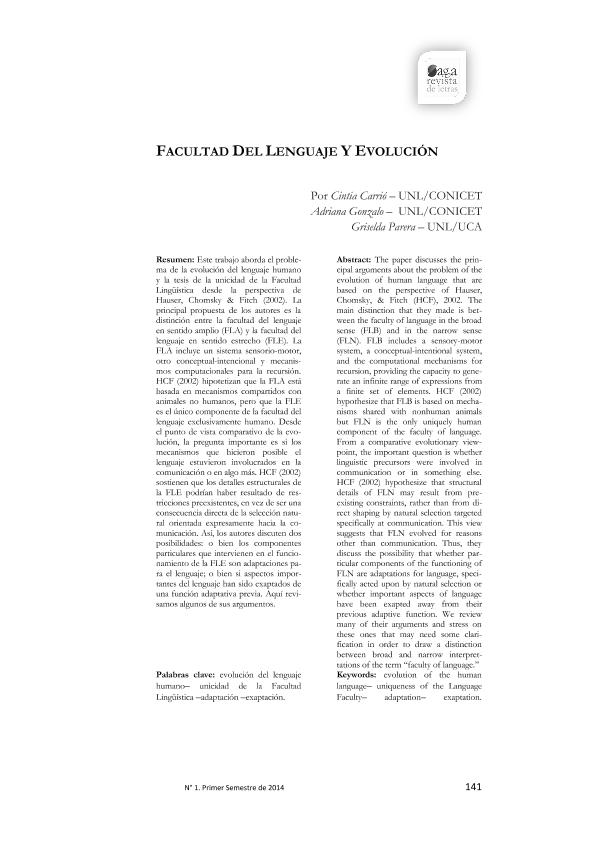Artículo
Este trabajo aborda el problema de la evolución del lenguaje humano y la tesis de la unicidad de la Facultad Lingüística desde la perspectiva de Hauser, Chomsky & Fitch (2002). La principal propuesta de los autores es la distinción entre la facultad del lenguaje en sentido amplio (FLA) y la facultad del lenguaje en sentido estrecho (FLE). La FLA incluye un sistema sensorio-motor, otro conceptual-intencional y mecanismos computacionales para la recursión. HCF (2002) hipotetizan que la FLA está basada en mecanismos compartidos con animales no humanos, pero que la FLE es el único componente de la facultad del lenguaje exclusivamente humano. Desde el punto de vista comparativo de la evolución, la pregunta importante es si los mecanismos que hicieron posible el lenguaje estuvieron involucrados en la comunicación o en algo más. HCF (2002) sostienen que los detalles estructurales de la FLE podrían haber resultado de restricciones preexistentes, en vez de ser una consecuencia directa de la selección natural orientada expresamente hacia la comunicación. Así, los autores discuten dos posibilidades: o bien los componentes particulares que intervienen en el funcionamiento de la FLE son adaptaciones para el lenguaje; o bien si aspectos importantes del lenguaje han sido exaptados de una función adaptativa previa. Aquí revisamos algunos de sus argumentos The paper discusses the principal arguments about the problem of the evolution of human language that are based on the perspective of Hauser, Chomsky, & Fitch (HCF), 2002. The main distinction that they made is between the faculty of language in the broad sense (FLB) and in the narrow sense (FLN). FLB includes a sensory-motor system, a conceptual-intentional system, and the computational mechanisms for recursion, providing the capacity to generate an infinite range of expressions from a finite set of elements. HCF (2002) hypothesize that FLB is based on mechanisms shared with nonhuman animals but FLN is the only uniquely human component of the faculty of language. From a comparative evolutionary viewpoint, the important question is whether linguistic precursors were involved in communication or in something else. HCF (2002) hypothesize that structural details of FLN may result from preexisting constraints, rather than from direct shaping by natural selection targeted specifically at communication. This view suggests that FLN evolved for reasons other than communication. Thus, they discuss the possibility that whether particular components of the functioning of FLN are adaptations for language, specifically acted upon by natural selection or whether important aspects of language have been exapted away from their previous adaptive function. We review many of their arguments and stress on these ones that may need some clarification in order to draw a distinction between broad and narrow interprettations of the term “faculty of language.”
Facultad del lenguaje y evolución
Fecha de publicación:
06/2014
Editorial:
Escuela de Letras - Universidad de Rosario
Revista:
SAGA. Revista de Letras
ISSN:
2408-4409
Idioma:
Español
Tipo de recurso:
Artículo publicado
Clasificación temática:
Resumen
Archivos asociados
Licencia
Identificadores
Colecciones
Articulos(CCT - ROSARIO)
Articulos de CTRO.CIENTIFICO TECNOL.CONICET - ROSARIO
Articulos de CTRO.CIENTIFICO TECNOL.CONICET - ROSARIO
Articulos(CCT - SANTA FE)
Articulos de CTRO.CIENTIFICO TECNOL.CONICET - SANTA FE
Articulos de CTRO.CIENTIFICO TECNOL.CONICET - SANTA FE
Citación
Carrio, Cintia Valeria; Gonzalo, Adriana Noemi; Parera, Griselda Sofía; Facultad del lenguaje y evolución; Escuela de Letras - Universidad de Rosario; SAGA. Revista de Letras; 1; 6-2014; 141-177
Compartir




